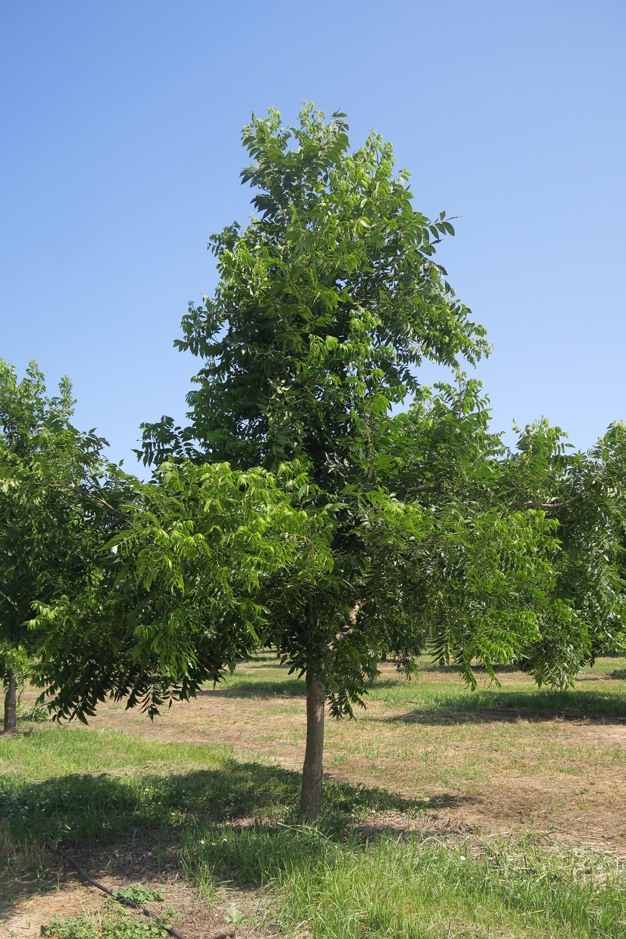Following in the footsteps of almonds and pistachios, could pecans become established in France as well? That is the ambition of French Pécan, which wants to develop and structure a French pecan sector. Although the crop is still in its infancy, more and more producers seem to be taking an interest in this nut from North America. Mathieu Duflos is project manager at the French Agroforestry Association which is leading the French Pécan project with the Nouvelle-Aquitaine region.
The French Pécan project is supported by the European Union (FEADER), the Nouvelle-Aquitaine region and the Lot-et-Garonne department / © Association Française d'Agroforesterie
Pecan nuts: what are the advantages?
Originally from North America, the pecan tree (Carya illinoinensis) has a number of agronomic advantages that could meet the needs of French producers in the face of climate change. Many farms are now opting to diversify (almonds, pistachios and even exotic fruits). In addition to the advantage of fully mechanized harvesting, the pecan is a hardy tree adapted to warm climates, tolerant to frost (down to -10°C) and drought. But Mathieu Duflos warns that "pecan trees are not the magic solution that should be planted everywhere! Although the acreage in France is still small, at "less than 100 hectares", pecan cultivation could increase rapidly. "According to the figures available, there are currently around fifteen pecan growers in France." The profiles of the producers and the farms are fairly heterogeneous. "There are cereal growers, tree growers, soft fruit growers and even a tea grower. Some grow 5 trees, while others have planted more than 5 hectares," explains Mathieu Duflos.
The majority of production is currently located in the southwest of France (Occitanie and Nouvelle-Aquitaine), but is also spreading to slightly colder regions. "From Perpignan to the north of France," according to Mathieu Duflos. "Pecan trees grow at low temperatures, but we cannot say for sure if production will be profitable there." While the tree is frost-resistant, its buds are sensitive to late frosts. "The pecan tree will not die, but yields and quality may be lower."
What is the French Pécan project?
The aim of the French Pécan project is to structure the French pecan sector upstream and downstream by acquiring knowledge and technical references on pecan growing. Although the project is currently being led by the French Agroforestry Association, it will benefit "all producers, whatever their production model," explains Mathieu Duflos. "The priority for us today is to gain a better understanding of how trees work in France, because this is still an experimental crop," and to achieve this, the French Agroforestry Association is focusing on a number of points: studying the phenology of the pecan tree, the behaviour of different varieties in terms of budburst, flowering and fruit ripening; designing and testing agroforestry production systems, as well as defining technical itineraries adapted to the soil and climate conditions in France." We are going to test 15 varieties - out of almost 200 - based on data from Spain, which is already ten years ahead of us, and from Italy. We will then cross-reference the data to develop our knowledge, so that we can answer producers' questions and help them develop their projects."
As part of a call for projects, French Pécan hopes to roll out the initiative over the next 5 years, in particular to set up 2 additional experimental plots and support 20 farmers with agroforestry planting projects.
What are the prospects for pecans on the French market?
Although the demand is still low, pecans have every chance of satisfying the taste buds of French consumers. In addition to their numerous nutritional qualities, "they have a finer flavour and they are less astringent than the common walnut." However, despite these qualities, the pecan is still largely unknown to the general public, with only 1,000 tons of kernels consumed in France (93% come from Mexico and the United States, and European imports account for 14,500 tons a year). To get the most out of the pecan kernel, the French Pécan project is also working on developing the post-harvest phase. "The difficulty is that the traditional crackers used for other nuts are not suitable for pecans. We need to design a delicate tool that is suitable for cracking the pecan without damaging it, because we are seeing a lot of breakage. Further work is needed to manufacture and test a prototype breaking machine."
For more information:
Mathieu Duflos (project manager)
[email protected]
